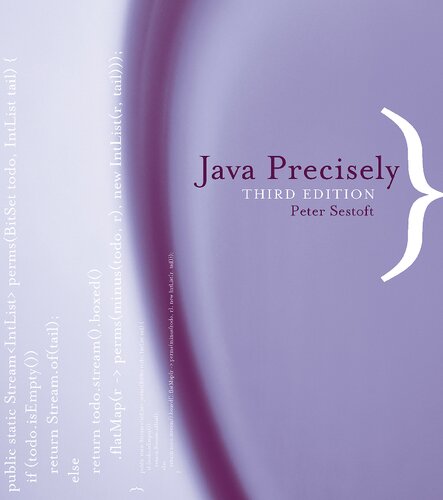

Most ebook files are in PDF format, so you can easily read them using various software such as Foxit Reader or directly on the Google Chrome browser.
Some ebook files are released by publishers in other formats such as .awz, .mobi, .epub, .fb2, etc. You may need to install specific software to read these formats on mobile/PC, such as Calibre.
Please read the tutorial at this link. https://ebooknice.com/page/post?id=faq
We offer FREE conversion to the popular formats you request; however, this may take some time. Therefore, right after payment, please email us, and we will try to provide the service as quickly as possible.
For some exceptional file formats or broken links (if any), please refrain from opening any disputes. Instead, email us first, and we will try to assist within a maximum of 6 hours.
EbookNice Team

Status:
Available4.6
33 reviewsThe third edition of Java Precisely provides a concise description of the Java programming language, version 8.0. It offers a quick reference for the reader who has already learned (or is learning) Java from a standard textbook and who wants to know the language in more detail. The book presents the entire Java programming language and essential parts of the class libraries: the collection classes, the input-output classes, the stream libraries and Java 8's facilities for parallel programming, and the functional interfaces used for that.
Though written informally, the book describes the language in detail and offers many examples. For clarity, most of the general rules appear on left-hand pages with the relevant examples directly opposite on the right-hand pages. All examples are fragments of legal Java programs. The complete ready-to-run example programs are available on the book's website.
This third edition adds material about functional parallel processing of arrays; default and static methods on interfaces; a brief description of the memory model and visibility across concurrent threads; lambda expressions, method reference expressions, and the related functional interfaces; and stream processing, including parallel programming and collectors.